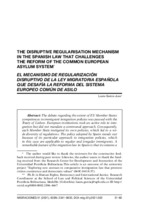| dc.contributor.author | García-Juan, Laura | |
| dc.coverage.spatial | Seccional Medellín. Escuela de Derecho y Ciencias Políticas. Facultad de Derecho | spa |
| dc.date.accessioned | 2021-05-12T15:21:54Z | |
| dc.date.available | 2021-05-12T15:21:54Z | |
| dc.date.issued | 2021 | |
| dc.identifier.citation | GARCÍA-JUAN, L. (2021). The Disruptive Regularisation Mechanism in the Spanish Law that Challenges the Reform of the Common European Asylum System, Migraciones, ISSN: 2341-0833, vol. 51, may 2021, pp. 31-60. | spa |
| dc.identifier.issn | 2341-0833 | |
| dc.identifier.uri | http://hdl.handle.net/20.500.11912/8514 | |
| dc.description | 30 páginas | spa |
| dc.description.abstract | The debate regarding the extent of EU Member States competences in immigrant integration policies was paused with the Treaty of Lisbon. European institutions took an active role in integration but did not mandate a communal approach. Consequently, each Member State instigated its own policies, which led to a wide diversity of regulations. The policy adopted by Spain stands out because of its particular approach to integration policies, which in this case are applicable to regular and irregular immigrants. A remarkable feature of the migration law in Spain is that it contains a regularisation mechanism for irregular immigrants that does not require them to have a visa in order to obtain the status of temporary residency. This mechanism is known as arraigo social (social ties). In these cases, access to regularity depends on the level of social integration that the immigrant can prove to have achieved. This article analyses the statistics on the use of this mechanism in Spain and discusses whether it could offer a path to asylum seekers looking for an official response after several years of waiting in the EU. | spa |
| dc.description.abstract | El debate sobre el alcance de las competencias de los Estados miembros de la UE sobre políticas de integración de inmigrantes llegó a su fin con el Tratado de Lisboa. Las instituciones europeas adoptaron un papel activo en integración pero sin imponer un enfoque comunitario. Cada país construyó así sus propias políticas, lo que derivó en una amplia diversidad de regulaciones entre las que destaca el modelo seguido en España por su enfoque particular del concepto de integración, aplicable aquí tanto a inmigrantes en situación regular como irregular. Como consecuencia directa de ello, una característica propia de la ley migratoria española es que contiene un mecanismo de regularización dirigido a los
inmigrantes en situación administrativa irregular que no requiere ningún tipo de visado y por el que pueden acceder a un permiso de residencia temporal. Este mecanismo se conoce como arraigo social. En estos supuestos, el acceso a la regularidad depende fundamentalmente del nivel de integración social que el inmigrante demuestre haber alcanzado. Este artículo revisa las estadísticas de uso de este mecanismo de regularización en España y analiza si podría constituir una vía legal válida para los solicitantes de asilo que, tras varios años de espera en la Unión Europea, todavía no han recibido una resolución oficial. | spa |
| dc.format.mimetype | application/pdf | |
| dc.language.iso | eng | |
| dc.relation.ispartof | Migraciones vol. 51, may 2021, pp. 31-60. | spa |
| dc.rights | Attribution-NonCommercial-NoDerivatives 4.0 International | * |
| dc.rights.uri | http://creativecommons.org/licenses/by-nc-nd/4.0/ | * |
| dc.subject | CEAS | spa |
| dc.subject | Asylum seekers | spa |
| dc.subject | Integration policy | spa |
| dc.subject | Integration measures | spa |
| dc.subject | European Union | spa |
| dc.title | The Disruptive Regularisation Mechanism in the Spanish Law that Challenges the Reform of the Common European Asylum System | spa |
| dc.title.alternative | El mecanismo de regularización disruptivo de la ley migratoria española que desafía la reforma del sistema europeo común de asilo | spa |
| dc.type | article | spa |
| dc.rights.accessRights | openAccess | spa |
| dc.type.hasVersion | publishedVersion | spa |
| dc.description.sectional | Medellín | spa |
| dc.identifier.instname | instname:Universidad Pontificia Bolivariana | spa |
| dc.identifier.reponame | reponame:Repositorio Institucional de la Universidad Pontificia Bolivariana | spa |
| dc.identifier.repourl | repourl:https://repository.unab.edu.co/ | |


